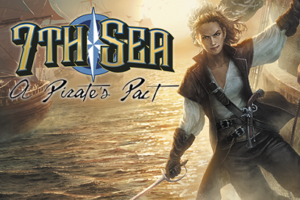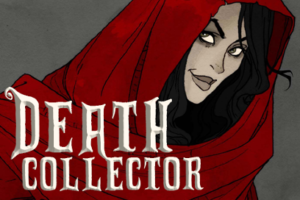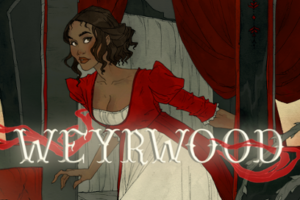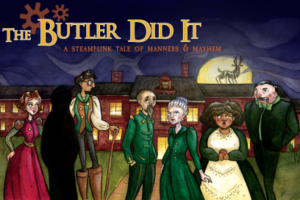Dec 17
2018
Author Interview: Kyle Marquis, “Tower Behind the Moon”
Posted by: Mary Duffy | Comments (0)
You are the greatest magician in the Sublunar World. It is not enough. As a rare Conjunction approaches, immortality is within reach. But the gods have noticed you trying to unlock the doors of heaven. Some demand you ascend–or else–while others plot your destruction. There are only two paths for you now, archmage: immortality or annihilation.Tower Behind the Moon, is a 400,000-word interactive epic fantasy novel by Kyle Marquis, author of Empyrean and Silverworld. I sat down with Kyle to learn more about his evolution as a writer for Choice of Games. Tower Behind the Moon releases this Thursday, December 20th.
We’ve talked a little about Tower Behind the Moon in your Silverworld interview, but now that it’s complete, tell me a little more about this world. It’s an extremely elaborate fantasy with wizards, mages, lords, gods, monsters, angels, hedge-witches, warlocks, bards, dragons, castellans…it’s a lot.
One thing I wanted to do with Tower is take well-established setting assumptions and show them from a different perspective. Tower‘s Sublunar World has a lot going on, but the elements are familiar to any reader of fantasy: wizards and dragons and angels, all the big hits. In Tower, it’s your perspective that changes. You’re an archmage. Those world-shaking powers aren’t like narrative engines or forces of nature: they’re companions, rivals, even nuisances. On several occasions your peers casually throw regular people into what, in a “normal” fantasy, would be world-altering quests. I wanted to inject some wonder back into classic fantasy by offering players the perspective of someone who drives that wonder, rather than someone who marvels at it.
Who was your favorite NPC to write? I am a sucker for the monster.
Everybody loves that sassy golem! (Or skeleton if you’re a necromancer or elemental if you’re a summoner, etc.–the sassiness remains constant.) But I most enjoyed the juxtaposition of your apprentice (ambitious, arrogant, occasionally selfish and greedy but also self-conscious and frightened) and your mentor, who failed to ascend and now follows you around as a self-pitying ghost. You’re in the middle of these two character arcs, both as important as yours and both reflections of your own ambitions. You have the opportunity to shape the destinies of both magicians, but your actions don’t take place in a vacuum; constrained by circumstance, you may end up sacrificing one or both. There’s a sort of madness to the magicians in Tower, a hunger for power and prestige that the player can’t help but notice–because your fellow magicians never seem to notice their own motivations.
This makes the third of three very long games with us: Empyrean, Silverworld, and now Tower, all published in the last two years. Your fourth game with us will be Pon Para and the Great Southern Labyrinth, which depending on how long beta takes might land in late spring of 2019. That’s got to make you our most prolific writer at this point, certainly in terms of speed. But I’m interested also in the different worlds and tropes you’re exploring in each game.
When I was a kid, I read and watched a lot of formulaic, imitative stuff. I loved it, of course, and often I still do, but even as a kid I could see how the tropes I loved (the flying aces and cyberpunk cities that fueled Empyrean, the lost kingdoms that inspired Silverworld, etc.) were in service of…nothing. The writers didn’t really have anything to say about the tropes they used. I’m not saying that every story needs to be “about” something, but I grew up on so much surface-level entertainment that as I started to find my own voice and write my own stories, one of my goals was to return to the trope-heavy stuff I grew up with and, sort of, “fill it up” with things that matter to me. Empyrean and Silverworld were more overtly political, I think–Empyrean was an attempt to get the punk back in [whatever]punk fiction and tell a story about exploitation and resistance; Silverworld is about colonization and the excuses people make for greed. Tower is, I think, less social, more personal; it’s about wealthy and educated people (magicians, in this case) behaving in ways that aren’t only “bad,” but that are really incomprehensible–even to them. Tower surrounds the player with people who, despite all their power and knowledge, are doing what they’re “supposed to do,” bickering for scraps of magic and betraying each-other to the admiration of their peers.
It’s also got a very cool scene where you fight a bunch of dinosaur ghosts on a bridge with a bone sword. I actually do love all these tropes.
I feel like we’re getting to the point where our readers can feel what makes a Kyle Marquis game a Kyle Marquis game. But do you have any personal favorites in the rest of the Choice of Games catalog? Recent games?
I loved Katherine Nehring’s Grand Academy for Future Villains, which definitely felt like someone else taking loved, but well-used, tropes, and filling them up with personal significance. And I, Cyborg is brilliantly written–I mean, the whole story is great, but just at the level of the individual sentence, there’s so much craft there; Tracy Canfield manages a light and charming tone, reminiscent of the best Infocom games, while still maintaining tension and excitement through the entire narrative. One of these days I plan to make a deep dive into the “fantasy of manners” genre, which is this obscure little sub-genre in regular fiction, but which seems to be one of the most successful and popular parts of the Choice of Games catalog.
You’re kind of a DnD-ish fellow. You’ve got this project Hex a Day?
Every day, a new location-based idea seed for tabletop fantasy games! I also have dungeons and whole adventure modules on my Patreon. A lot of RPG writing is interesting, but not immediately useful for people who have games to run that night; I wanted to provide ideas that people can use almost right away. Also, the best ideas end up in my interactive fiction–Tower has a few scenes that began as hex-map locations, especially when you journey into the underworld in Chapter 5.
And now Pon Para is coming up next. This is actually a trilogy, right? Which you’ve nearly finished the first part of.
Pon Para is a Bronze Age fantasy adventure. It’s a sprawling heroic journey that takes the player from haunted northern forests to monster-haunted islands and out to a desert empire inspired by ancient Persia, all while trying to uncover the history of a still more ancient civilization that hold the key to saving a (literally!) dissolving world.







 Steam
Steam Twitter
Twitter Facebook
Facebook Tumblr
Tumblr RSS Feed
RSS Feed

